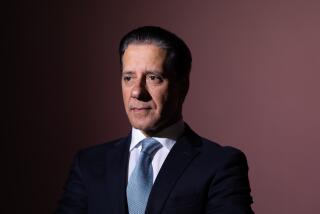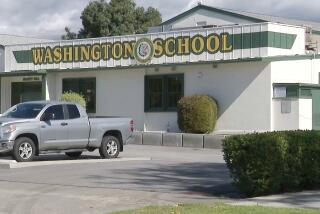Nowadays, Principals Must Walk a Fine Line
- Share via
While the Pacoima community rejoices at news of the hiring of Irene Smerigan as the new principal of Pacoima Elementary School, I cannot help but wonder: Can she perform the miracles expected of her? Can one person (a woman, yet) bring order to a school that, according to reports, is among the lowest-ranking in the entire Los Angeles Unified School District? Will she win over parents so that they support new and improved programs?
Long, long ago, I attended Pacoima Elementary. Along with my friends, I skipped off to Room K (for kindergarten) and was greeted by Mrs. Prudence L. Harding, the personable principal whom even the bullies feared. Feared and respected. More than once she was wont to call in our mostly illiterate parents to discuss a student’s behavior. In broken English, our parents apologized. Once at home they reached for the belt while we tried to hide.
Like most students we either liked or disliked our teachers, yet collectively stood in awe of the petite woman to whose office we were sent when unruly. Never had the walk from a classroom seemed so long. She greeted us with a sweet smile, but her eyes were like steel. She first scolded, then reached into a drawer for the infamous ruler while we tried not to cry. In the end, most got only a scolding.
School principals have always held an esteemed--but often precarious--position. On their shoulders rest not only responsibility for student education and safety but also accountability to the public. Although a school administrator may have a thorny relationship with parents, she still must function within that group.
What exactly makes a good principal? A friend, parent to three children, thinks, “A principal’s primary job should be to provide quality education through curriculum and staff development. And to ensure that state-level specifications are met.”
My neighbor, whose toddler will enter kindergarten next year, says, “An effective principal should make kids toe the line and be willing to listen to parents. Most of all, they should make schools safe for kids.”
What about the role of parents? Have they become too powerful? Today, many parents are involved in school politics. Parents clubs have replaced the formerly Anglo-dominated PTA organizations that in my children’s school held sway. More and more padres de familias (heads of families) have a say in how a school is being run--or not, for that matter. At Charles Maclay Middle School in Pacoima, the parents club is quite active and has established literacy classes for parents who lack English skills, in an effort to have them become more involved. Clearly parental input can effect positive change.
In the old days, parents like mine--Mexican immigrants who spoke only Spanish--rarely complained to a school principal about the level of education or a teacher’s ineffectiveness. They did not question corporal punishment or bemoan the obsolete books that were our lot. Rather, they were grateful for the education given their hijos (children). More than once, they ate humble pie.
Today parents--Latino immigrants included--are very well-informed of what goes on in their neighborhood schools. More important, they feel comfortable challenging school policy--and administrators. But these new liberties can result in chaos and eradicate a principal’s goodwill.
One can only wish Smerigan buena suerte--good luck--in her new assignment. Problems are sure to arise but her administrative experience, knowledge of Latino culture and proficiency in Spanish will no doubt help her raise the educational level at Pacoima Elementary.
More to Read
Sign up for Essential California
The most important California stories and recommendations in your inbox every morning.
You may occasionally receive promotional content from the Los Angeles Times.













